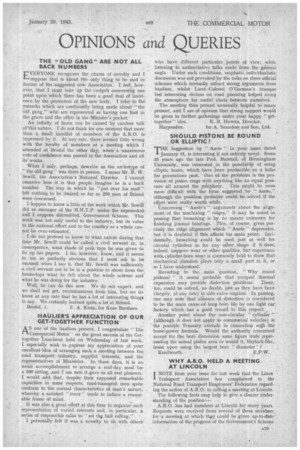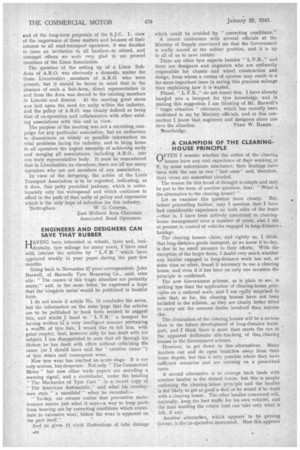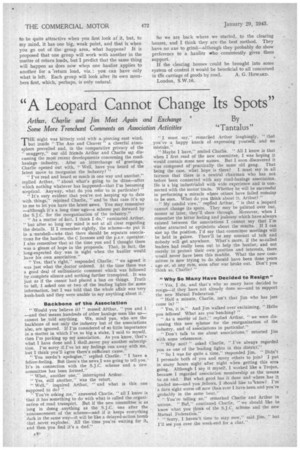OPINIONS and QUERIES
Page 31

Page 32

Page 34

If you've noticed an error in this article please click here to report it so we can fix it.
THE " OLD GANG" ARE NOT ALL BACK NUMBERS " VERYONE recognizes the charm of novelty and I suppose that is about the only thing to be said in favour of the suggested new Association. I feel, however, that I must take up the cudgels concerning one point upon which there has been a good deal of insistence_ by the promoters of the new body. I refer to the remarks which are continually being made about "the old gang," who are represented as having one foot in the grave and the other in the Minister's pocket. An infinity of harm can be caused by careless talk of this nature. I do not think for one moment that more than a small handful of members of the A.R.O. is impressed by it. At any rate, there seemed little wrong with the loyalty of members at a Meeting which I attended at Bristol the other day, when a unanimous vote of confidence was passed in the Association and all its works.
What I may, perhaps, describe as the archetype of "the old gang" was there in person. I mean Mr. R. W. • Sewill, the Association's National Director. I cannot conceive how it is that people imagine he is a back number. The way in which he "put over his stuff" left nothing to be desired so far as 250 men of Bristol were concerned.
I happen to know a little of the work which Mr. Sewill did as manager of the H.N.T.P. under the superseded and I suppose discredited, Government Scheme. This work was not only useful to the industry, but its value to the national effort and to the country as a whole cannot be over-estimated.
I do not pretend to know to what extent during that time Mr. Sewill could be called a civil servant or, in consequence, what shade of pink tape he was given to tie up his papers. I do, however, know, and it seems to me so perfectly obvious that I must ask to be excused when I say it, that Mr. Sewill was sufficiently a civil servant not to be in a position to shout from the house-tops what he felt about the whole scheme and what he was doing for the industry. Well, he can do this now. We do not expect, and we shall not get, recriminations from him, but we do know at any rate that he has a lot of interesting things to say. We certainly learned quite a lot at Bristol.
Bristol, 1. E. A. KNEE, for Knee Brothers.
-HAULIER'S APPRECIATION OF OUR 'GET-TOGETHER FUNCTION
A S one of the hauliers present, I congratulate "The
Commercial Motor" on the great success of the Gettogether Luncheon held on Wednesday of last week. I especially wish to pxpress my appreciation of your excellent idea of arranging such a meeting between the road transport industry, supplier interests, and the representatives of Ministries. In these days, it is no mean accomplishment to arrange a mid-day meal for a 500 sitting, and I am sure it gave us all real pleasure. I would add that, despite their supposed remarkable capacities in some respects, road-transport men quite conform to the normal characteristics of man's nature. whereby a satisfied " inner " tends to induce a reasonable frame of mind.
It was also a great effoet at this time to organize such representation of varied interests and, in particular, a series of responsible talks to "set the ball rolling." I personally felt it was a novelty to sit with others who have different particular points of view, whilc listening to authoritative talks made from the general angle. Under such conditions, emphatic individualistic discussion was not provoked by the talks on three official schemes which normally attract strong arguments from hauliers, whilst Lieut.-Colonel O'Gorman's brusque but interesting dictum on road planning helped along the atmosphere for useful chats between ourselves.
The meeting thus proved unusually helpful to many present, and I am of opinion that strong support would be given to further gatherings under your happy " get together " idea. E. B. HOWES, Director, Harpenden. for A. Saunders and Son, Ltd.
SHOULD PISTONS_BE ROUND OR ELLIPTIC?
THE suggestion by " Azote " in your issue dated January 15, is interesting if not entirely novel. Some 25 years ago the late Prof. Burstall, of Birmingham University, was interested in the possibility of using elliptic bores, which have 'been producible, on a lathe for generations past. One of the problems is the pro'vision of piston rings with anything like an equal pressure all around the periphery. This might be even more difficult with the form suggested by " Azote," although the problem probably could be solved if the effort were really worth while.
Concerning " Azote's " arguments about the alignment of the machining "ridges," it may be noted in passing that broaching is by no means unknown for finishing journal bearings. This, of course, gives precisely the ridge alignment which " Azote " deprecates, but it is doubtful if this affects his main point. Incidentally, broaching could be used just as well for circular cylinders as for any other shape if it does. indeed, impuove wear or other qualities, but'experience with, cylinder-bore wear is commonly held to ghow that mechanical abrasion Plays only a small part in it, or so I have understood.
Reverting to the main question, "Why ronnd pistons? " it seems probable that unequal thermal expansion may provide distortion problems. These, too, could be solved, no doubt, jat as they have been (largely, at any rate) in side-valve engines. In passing, one may note that alisence of distortion is considered to be the main cause .of long bore life by one light car factory which. has a good record in this respect... Another point about the non-circular " cylinder " (although it does not apply to commercial vehicles) is the possible Treasury attitude in connection with the horse-power formula. Would the authority concerned accept for the bore dimension some figure truly representing the actual pistbn area or would it, Shylock-like, insist upon using the largest bore " diameter' ? Kenilworth. E.P.W.
WHY A.R.O. HELD A MEETING AT LINCOLN
I NOTE from your issue for last week that the Lines
Trabsport Association has complained to the National Road Transport Employers' Federation regarding the action of A.R.O. in calling a meeting at Lincoln. The following facts may help to give a clearer understanding of the position: A.R.O. has had members at Lincoln for many years. Requests were received from several of these members for a meeting at which they could be given up-to-date information of the progress of the Government's Scheme and of the long-term proposals of the S.J.C. view of the importance of these matters and because of their interest to all road-transport operators, it was decided to issue an invitation to all hauliers--to attend, and amongst others we were very glad to see present members of the Lines Association.
The question of the setting up of a Lincs SubArea of .A.R.O. was obviously a domestic matter for those Lincolnshire , members of A.R.O. who were present, but it should be borne in nand that in the absence of such -a Sub-Area, direct representation in and from the Area was denied to the existing members in Lincoln and district. At the meeting great stress
as laid upon the need for unity within the industry, and the policy of A.R.O. was clearly defined as being that of co-operation and collaboration with other existing associations with this end in view.
The purpose of the meeting was not a recruiting campaign for any particular association, but an endeavour to disseminate as widely as possible information on vital problems facing the industry, and to bring home to all operators the urgent necessity of achieving unity and merging all associations, including A.R.O., into one truly representative body. It must be remembered that in Lincolnshireaas elsewhere, there are all too many operators who are not members of any association.
In 'view of the foregoing, the action of the Lines Transport Association is to be regretted, indicating, as it does, that petty parochial jealousy, which is unfortunately only too widespread and which continues to stfind in the path of that unity of policy and expression which is the only hope of salvation for this industry.
'Nottingham.
W G. COOPER,
East Midland Area Chairman Associated Road Operators.
ENGINEERS AND DESIGNERS CAN SAVE THAT RUBBER HAVING been interested in wheels, tyres and, incidentally, tyre mileage for many years. I have read with interest the articles by " L.V.B." which have appeared weekly in your paper ,during the past -few months.
Going back to November 27 your correspondent, John Barwell, of Barwells Tyre Renewing Co., said, inter alia: "The causes of this tragic situation are probably many," and, in the same letter, he expressed a hope that the coraplete series-would be published in booklet
form.
I do not know if article No. 15 concludes the series, but the information on the same page that the articles are to be published in book form seemed to auggest this, and whilst I hand to " L.V.B." a bouquet for having written in a very intelligent manner pdrtraying a wealth of tyre .lore, I would like to tell him, with great respect, that, however ably he has dealt with his subject, I am disappointed,to note that all through his *dictum he has dealt with effect without criticizing the cause (or I should have said the "creative cause ") of tyre strain and consequent wear.
Now tyre wear has reached an acute stage. It is not only serious, but .desperate. Not only " The Commercial Motor " but now other trade papers are sounding a warning signal, and a cantributor, under the heading " The Mechanics of Tyre Care" in a recent copy of "The American Automobile," said what his countrymen style " a mouthful" when he recorded:—
" To-day, car owners realize that preventive maintenance means just what it says—a way to keep parts from wearing out by correcting conditions which contribute to excessive wear, before the wear is apparent on the part itself."
And he gives 12 vivid illuSarations of tube damage which could be avoided .by "correcting conditions."
'A recent conference with several officials at the Ministry of Supply convinced me that the Government is really scared at the rubber position, and it is up to all of us to save rubber.
There are other tyre experts besides " L.V.B.," and there are designers and engineers who are ordinarily responsible for chassis and wheel construction and design, from whom a census of opinion may result in a far-more-important issue in saving this precious mileage than explaining how it is wasted.
Please, " L.V.B.," do not resent this. I have already hanged you a bouquet for tyre knowledge, and in making this suggestion I am thinking of Mr. Banyan's "tragic situation " reference, which has recently been confirmed to me by Ministry officials, and in this connection I know that engineers and designers alone can
save the situation. Bazar) W. BAKER. Mourbridge.
A CHAMPION OF THE CLEARINGHOUSE PRINCIPLE OFTEN I wonder whether the critics of the clearing houses have any real experience of their working or if, by some unfortunate mischance, their 'dealings have been with the one or two "bad ones" and, therefore, their views are somewhat clouded.
The reason for this trend of thought is simple and may be put in the form of another question, thus : "What is the alternative to the clearing house? "
Let us examine this question more closely. But, before proceeding farther, may I mention that I have had considerable experience on both sides of the fence —that is, I have been actively concerned in clearinghouse management over a number of years, also I ain at present in control of vehicles engaged in long-distance haulage.
The clearing houses claim, and rightly so, I think, that long-distance goods transport, as we know it to-day, is due in no small measure to their efforts. With the exception of the larger firms, I doubt very much whether any haulier engaged in long-distance work has not, at some time or other, found it necessary to use a clearing house, and even if it has been on only one occasion the principle is confirmed.
The new Government echeme, as is plain to see, is nothing less than the application of clearing-house prin, ciples on a national scale, and I am av.11y surprised to note that, so far, the clearing houses have not been included in the scheme, as they are clearly better fitted to carry out the onerous duties involved than anyone else.
The elimination of the clearing houses will be a serious blow to the future development of long-distance transport, and I think there is more than meets the eye in the apparent deliberate side-tracking of the„ clearing houses in the Government scheme.
However, to get down to the. alternatives. Many hauliers can and do open branches away from their home depots, but this is only possible where they have sufficient resources and are running on a prescribed rpute.
A second alternative is to arrange back laads with another haulier in the distant towns, but this is simply endorsing the clearing-house principle and the haulier is idet likely to get as good a deal as he would if he dealt with a clearing house. The other haulier concerned will, naturally, keep. the best traffic for his own vehicles, and the man wanting the return load can take only what is left, if any.
Another alternativg, which aE:Tears to be gaining favour, is the co-operative movement. Now this appears
to be quite attractive when you first look at it, but, to my mind, it has one big, weak point, and that is when you go out of the group area, what happens? It is proposed that one group will work with another in the matter of return loads, but I predict that the same thing will happen as does now whop one haulier .applies to another for a 'return load, viz. : you can have only what is left. Each group will look after its own members first, which, perhaps, is only natural. Sc we are back where we started, to the clearing houses, and I think they are the best method. They have no axe to grind—although they probably do show preference to a haulier %who consistently gives them support.
If the clearing houses could be brought into some system of control it would be beneficial to all concerned in tlie carriage of goods by road. A. G. HOWARD. London, S.W.16.




















































